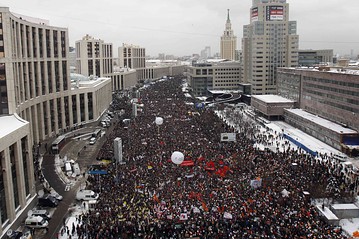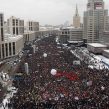
Russia Reluctantly Enters Into a New Revolution
Publication: Eurasia Daily Monitor Volume: 9 Issue: 1
By:

Russia has sunk into the usual hibernation of long seasonal holidays, but quite unusually it now lives simultaneously in two very different new years. The first one was planned very carefully by the Prime Minister, Vladimir Putin, and it started on September 24 with his long-expected announcement of the decision to return to the position of supreme power and stay in it for the next six years, or maybe twelve (Vedomosti, Nezavisimaya Gazeta, December 30). The second one arrived without any plan with the big rally on Bolotnaya Square in Moscow on December 10, and confirmed its real strength with the twice larger rally on Sakharov Avenue on December 24. There is one political preference that Putin and tens of thousands of protesters appear to have in common – a pronounced reluctance to experience a revolution as the memories of the devastating civil war of 1917-1922 run deep and reflections on current calamities in Libya and Syria are far from positive (Novaya Gazeta, December 17). Yet a revolution is already under way, because Putin’s new year is scheduled to end in early May with his presidential inauguration, while the year of the protesters could only end with his departure and the dismantlement of his corrupt regime (www.gazeta.ru, December 29).
The reluctant revolutionaries of the Bolotnaya and Sakharov rallies are a motley crowd, which has a rather ambivalent attitude to the leaders of so-called “irreconcilable opposition” like Boris Nemtsov, who are trying to take the lead in the protests (Ekho Moskvy, December 30). The first rally was primarily an emotional reaction to the blatant rigging of parliamentary elections in Moscow, but the second was much more a considered response to Putin’s attempt to dismiss and ridicule the protests, so the demands were very personal and the slogan that captured best their spirit was a rephrasing of Boris Yeltsin’s farewell: “You are tired. You should go” (www.forbes.ru, December 25). This narrow focusing gives the discontent a sharp edge, but it also exposes the leaderless opposition, so it tries to turn this weakness into strength. Writers Dmitri Bykov and Boris Akunin, crusading bloggers such as Aleksei Navalny, TV personalities including Leonid Parfenov, and rock musicians like Yuri Shevchuk appeal to different groups of urban middle class, so the protests become fluid and insuppressible like social networks.
Putin cannot understand the non-hierarchical nature of the “other side” and is more anxious about this “unknown” than he wants to show, dismissing the idea of a dialogue because there is nobody there to talk to (Kommersant, December 28). He has, nevertheless, engaged in a reshuffling of the Byzantine court, placing into the presidential administration his old cronies like Sergei Ivanov and loyal apparatchiks like Vyacheslav Volodin, and shifting down into the government too-street-smart-by-half manipulators like Vladislav Surkov (Moskovskiy Novosti, December 27). He also made President Dmitry Medvedev to declare moderately liberal political reforms keeping his distance from these “innovations” in order not to show weakness (www.gazeta.ru, December 28). What is even more out of character is a new campaign against corruption in state companies, which has claimed a few heads among the top managers of Gazprom (RBC Daily, December 30).
Protesters are not impressed with this maneuvering, but Putin’s core support base in the state bureaucracy is upset and disheartened. The legion of obedient servants has grave doubts about his idea of winning the presidential elections cleanly and convincingly assuming that the boss overestimates his support in the masses and underestimates the pressure on governors to deliver the right results that would push them to crude tampering (Moskovskiy Novosti, December 30). They also try to look one step forward to the second half of 2012, when a barely elected and stripped of his invincibility Putin would have to execute painful cuts in budget give-aways. The warnings about the extra-tough times ahead from the former finance minister Aleksei Kudrin, who has joined the crowds of protesters, have far more weight than Putin’s attempts to recycle the tired metaphor of Russia as an “island of stability” (www.newsru.com, December 31). The petro-revenues sustain a sluggish growth for now but investment activity could be better described as passivity, and the single most important indicator for Russia’s economic performance in 2011 is capital flight estimated at $85 billion (Kommersant, December 21).
This evacuation of money by Putin’s elites constitutes a financial guarantee against repressions because few of the owners of mansions in London or dachas in Sardinia would want to be implicated in a forceful crackdown. The protesters have discovered this weakness that makes Putin’s regime as much quasi-authoritarian as it is pseudo-democratic, so the fear factor has all but evaporated. The next rally planned for February 4 will quite probably show another doubling in the number of participants and there is time for at least two more rallies before the presidential elections in early March (Novaya Gazeta, December 31). Putin cannot realistically expect to win in the first round, and in the weeks before the second round the tide of joyful discontent could sweep away his campaign. He counts on the fact that the list of candidates does not feature a single credible alternative, but his pyramid of power cannot stand on the crumbling personal credibility of the leader who fears making a public appearance because of the prospect of booing.
The opposition disunited as it is has captured the initiative in creating a format of negotiations with Putin setting a wide “round table” and accepting Kudrin’s offer to serve as a go-between (Ekho Moskvy, December 31). The position paper for negotiations is fairly modest and aims at securing free and fair presidential elections, after which new parliamentary elections will be held without any discrimination of the opposition parties (Ezhednevny Zhurnal, December 30). Putin understands that the proposal is modeled after the “round table” in Poland in 1989 and implies his peaceful capitulation, but he also remembers the narrow escape from the KGB office in Dresden surrounded by angry crowds. He is caught in the dilemma of making a fool of himself by giving up too early and losing everything by procrastinating too long, but his bad choices still matter for keeping the Russian revolution on the peaceful track.




